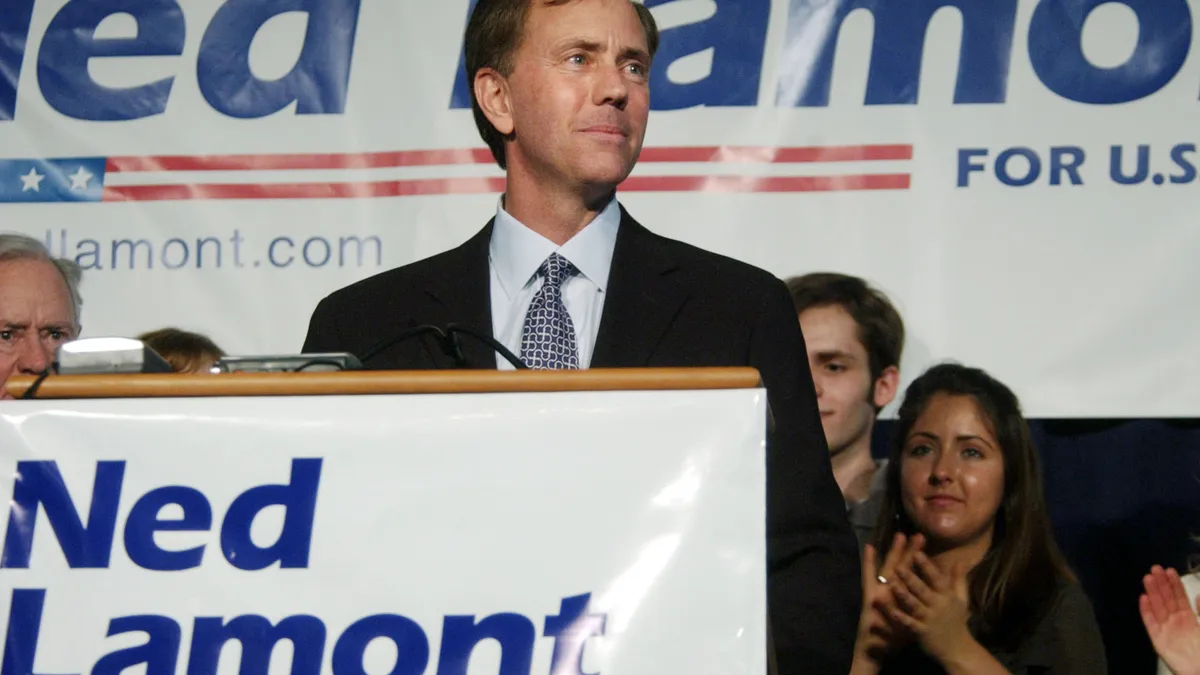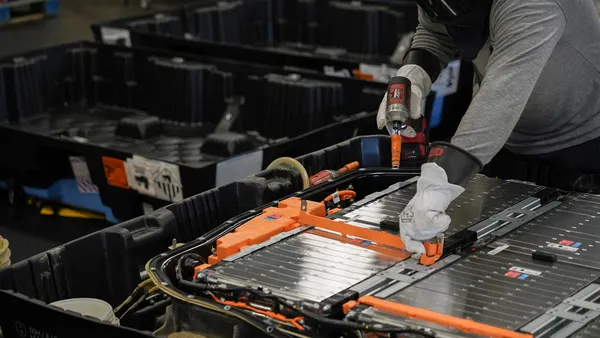UPDATE: June 17, 2021: Gov. Ned Lamont signed SB 1037 into law on June 16. Connecticut will accept more types of containers in its bottle return system starting in January 2023 and double its refund value from 5 to 10 cents starting January 2024.
Dive Brief:
- Legislation revamping Connecticut’s aging bottle bill is heading to Gov. Ned Lamont’s desk for a signature. If passed, SB 1037 would be the most significant update to the state’s container deposit law since it was first enacted in 1978.
- The bill calls for accepting more types of containers by 2023 and increasing bottle deposit values from 5 cents to 10 cents by 2024. It would increase the handling fee to help cover overhead costs at redemption centers and introduce a 5-cent surcharge for single-serving “nips” to help municipalities fund projects to curb litter from the small alcohol bottles.
- The bill underwent numerous last-minute amendments and updates to accommodate compromises from the beverage industry and others. The changes include sharing a cut of the deposits with distributors and allowing distributors to potentially create a stewardship program.
Dive Insight:
In Connecticut, less than half the bottles the current bill covers get returned, one of the lowest return rates in the country. Proponents of a bottle bill expansion say the system needs serious modernization to make it more effective, and the proposed updates will raise return rates and help control litter.
“With this bill we have the ability to put a large dent in the environmental issues that outdated bottle return policies create," said state Sen. Christine Cohen, co-chair of the legislature's Environment Committee, in a statement.
The state last updated its list of containers in 2009 to include bottled water. The bill would expand the list of containers for deposit to hard seltzer and hard cider, as well as noncarbonated beverages that aren’t part of the current law, such as containers for teas, sports drinks, juices, kombucha and “plant infused drinks." Connecticut currently has a nickel deposit on beer, carbonated soft drinks and water. The Connecticut League of Conservation Voters said such a significant expansion could add about 193 million containers to the state’s program each year.
Supporters say the expanded number of items allowed in the program – along with the doubled return value for such containers – will go a long way toward raising return rates.
“While the COVID-19 pandemic played a part in declining redemption in 2020, the downward redemption trend over the last 10 years is unmistakable proof that 5 cents is no longer the financial incentive it once was for consumers to return containers instead of throwing them away or littering them,” said Susan Collins, president of the pro-bottle bill Container Recycling Institute, in a statement.
If the bill becomes law, starting Oct. 1, Connecticut liquor wholesalers would begin collecting a 5-cent surcharge on 50 milliliter liquor bottles, known as “nips,” at the point of sale. The tiny bottles are an “especially troublesome” source of litter in the state and are too small to be processed through curbside recycling programs, typically leaving cleanup to volunteer crews who collect the bottles from parks and roadsides, according to state Sen. James Maroney. Money from the surcharge will be redistributed to municipalities to fund litter reduction efforts, he said in a statement.
Also effective in October, the bill would increase handling fees beverage distributors pay to redemption centers, which supporters say will encourage more return centers to open. The fees would increase from 1 cent to 2.5 cents on beer and other carbonated alcoholic beverages, while the 2-cent fee for soda, water and other nonalcoholic beverages would increase to 3.5 cents. The state has 18 redemption centers, but two are currently closed.
Julie Cammarata, a lobbyist who represents reverse vending machine companies and other recycling clients with stakes in the bill, said about $5 million in funding from escheats could go to a grant program to help fund return center locations in underserved communities. "We're trying to prevent people from having to take long bus rides to go redeem their bottles," she said.
Rep. Mary Mushinsky, one of the bill’s supporters, said longtime pushback from the beverage industry has made it impossible to update the bottle bill until now, but this year’s bill offers a few compromises.
Currently, all of the uncollected deposits go to the state general fund. Starting next year, deposits will gradually be shared with distributors, increasing to 55% of the deposits going to distributors by 2025. The bill also allows distributors to propose the creation of a stewardship organization that could operate and fund the program in the future, provided it obtains input from redemption centers, MRFs, municipal leaders, wine and spirits distributors and reverse vending machine operators.
Collins said the stewardship organization model in the bill lacks “transparency and accountability,” but beverage industry players such as American Beverage have welcomed strategies that give their members more of a chance to govern how bottles are handled. Earlier this year, the group proposed replacing Connecticut’s current bottle bill system with an alternative that would create a producer responsibility organization governed by bottle producers and distributors. That model would have mirrored the one in place in Oregon, which is paid for and run by bottle distributors and does not charge handling fees.
Other bill updates would require more retailers to provide reverse vending machines for beverage container returns by October of this year and would direct the legislature's Environment Committee to work with the wine and spirits industry to keep their glass bottles out of the waste stream.
Supporters believe the bill has a good chance of being signed, but it also has detractors. The Connecticut chapter of the National Waste & Recycling Association opposed the legislation, saying it hurts curbside collection systems by targeting the higher-quality materials MRFs typically sell. The group said leaves its members to collect lower-value items and drives up recycling costs, which get passed on to municipalities.
Five other states have pursued changes to their bottle bills this year but have so far not made much headway. Part of the momentum behind Connecticut's bill may be due to concerns over what will happen to regional waste costs once the nearby refuse-derived fuel plant, operated by the Materials Innovation and Recycling Authority, closes.











